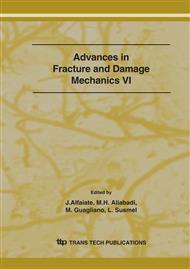p.325
p.329
p.333
p.337
p.341
p.345
p.349
p.353
p.357
Influence of Temperature and Increasing Traffic Flow on the Fatigue Damage of Welded Bridge Decks
Abstract:
Fatigue life assessment of critical bridge members using online monitoring data has been investigated in recent years. To make a quick and efficient evaluation, a representative block of strain cycles is usually defined. However, such block sometimes fails to cover the change in fatigue damage by temperature fluctuation and traffic growth, which is important to the life prediction of the welds in a long-span suspension bridge. To find the influence of temperature and traffic volume on the fatigue damage, an equivalent vehicle load method is dedicated through finite element analysis, and the statistical disposition of traffic flow has been conducted, using data from the Runyang Bridge. The influence of traffic growth can be estimated and eliminated from the total damage so that the temperature effect on the fatigue damage is finally obtained. It is found that temperature has a linear effect on the fatigue damage. According to the fitted relationship between fatigue damage, temperature and the traffic flow, a more objective fatigue assessment is undertaken, based on the rain-flow counting method and the Palgren-Miner rule.
Info:
Periodical:
Pages:
341-344
Citation:
Online since:
September 2007
Authors:
Keywords:
Price:
Сopyright:
© 2007 Trans Tech Publications Ltd. All Rights Reserved
Share:
Citation:


